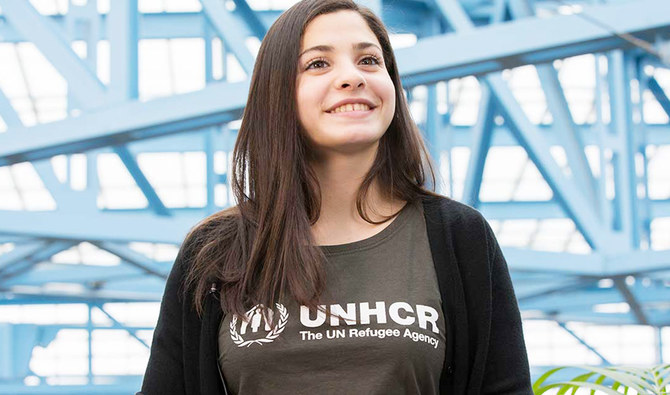GWANGJU/SOUTH KOREA: Syrian refugee Yusra Mardini, who almost drowned at sea fleeing her war-torn country four years ago, heaved a deep sigh after failing to set a personal best at the world swimming championships on Sunday.
Representing FINA’s independent athletes team, the 21-year-old looked up at the giant scoreboard and winced at her time of 1 minute 8.79 seconds in the 100-meter butterfly heats in South Korea.
“I’m not very happy actually,” Mardini told AFP.
“I had some problems with my shoulder but I’m back in training. I still have the 100m freestyle and I’m looking forward to that.”
Mardini’s time was more than 12 seconds slower than that of reigning champion Sarah Sjostrom and 47th overall, but she has come a long way since risking her life crossing from Izmir in Turkey to the Greek island of Lesbos in the summer of 2015.
Refugee swimmer Mardini knows what she is talking about when it comes to family separation for asylum seekers.
In 2015, she and her sister Sarah had escaped conflict in their homeland when the boat they were aboard with other refugees began sinking. They jumped out and swam part of the journey from Turkey to Greece.
They then embarked on an overland trip from Greece to Germany, evading local authorities in countries with immigration policies that barred them from legal entry. Along the way the sisters slept in train stations or wherever they could find shelter.
Mardini empathizes with families currently separated along the US southern border.
“This is the most terrible thing anyone can have — to live without a mom or to live without a family,” she said on Sunday at the world swimming championships where she’s competing as an independent athlete.
“I arrived in Greece in only jeans and a T-shirt,” said Mardini, who also swims in the 100m freestyle later this week. “Even my shoes were gone.”
“In the beginning I refused to be in a refugee team because I was afraid people would think I got the chance because of my story,” said Mardini, who now lives with her family in Berlin.
“I wanted to earn it. But then I realized I had a big opportunity to represent those people — so I took the chance and I never regretted it,” she added.
Mardini was 17 at the time. She is now a goodwill ambassador for the UN High Commissioner for Refugees. She famously competed at the Rio Olympics a year later under the refugee flag.
FASTFACT
• In 2015, she and her sister had escaped conflict in their homeland when the boat they were aboard with other refugees began sinking. They jumped out and swam part of the journey from Turkey to Greece.
• Mardini was 17 at the time. She is now a goodwill ambassador for the UN High Commissioner for Refugees.
“Rio was amazing. It was really exciting to see the reaction of people to the team. Now I’m representing millions of displaced people around the world and it really makes me proud.”
It is a far cry from life back in Syria, where rocket strikes would often shake the pool she trained at in Damascus.
“There were bomb attacks sometimes that would crack the windows around the pool,” said Mardini, who has addressed the UN General Assembly and whose story is set to be told in a Hollywood movie.
“I know people who lost their moms on the way or in the water — that got drowned — and I feel this is terrible,” she said.
Mardini said that from the time she left Syria she lived without her mother for six months. Eventually, they were reunited in Germany, where they now live in Berlin. “I felt so alone,” she said. “So lonely.”
The experience has prompted her to stand up for fellow asylum seekers in similar situations.
“Someone has to do something about it,” Mardini said. “The least we can do is talk about it, not just ignore it like everything else happening in the world.”
Mardini finished 47th out of 52 swimmers in the 100-meter butterfly heats on Sunday. Her other event in Gwangju is the 100 freestyle on Thursday.
She is attempting to again qualify for the Olympics as a member of the Refugee Olympic Team.
“My goal now is just to swim a new personal best,” she said. “And my next goal will be Tokyo 2020.”
Fellow Syrian Ayman Kelzieh was also forced to flee the country before competing at the 2014 Asian Games in Incheon.
Returning to Korea five years later, the 26-year-old now owns a fistful of national swim records, including the 50m, 100m and 200m butterfly.
“When the war started I had just moved to Damascus and I couldn’t get back home to Aleppo,” said Kelzieh, who now lives on the Thai island of Phuket.
“But even in Damascus bombs sometimes even went off at the swimming pool we trained at,” he added after taking a poolside selfie with his idol, South African star Chad le Clos.
“There were even attacks at the hotel I stayed in — I was lucky.”






















